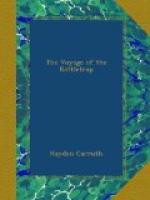“Good gracious!” exclaimed Jack. “Wish I could throw a stick of wood like that fellow.”
Another and another shot after the first one in quick succession. Sometimes there were two almost together, and we noticed the bigger and heavier the stick the higher and farther it was shot. We saw some almost a foot in diameter soaring like straws before the wind.
“What a baseball pitcher that man would make!” went on Jack, enthusiastically. “Think of his arm! Look at that big one go—it must weigh two hundred pounds!”
“Let’s get out of this shed and investigate the mystery,” I said.
Outside it was all clear. The narrow-gauge wood railroad ended on the edge of the steep hill overlooking the mills. Down this was a long wooden chute, or flume, like a big trough, which for the last thirty or forty feet at its lower end curved upward. Men were unloading wood from a train at the upper end. Each stick shot down the flume like lightning, up the short incline at the end, and soared away like a bird to the pile beyond and below the shed. A little stream of water trickled constantly down the chute to keep the friction of the logs from setting it on fire.
“That’s the most interesting thing here,” said Jack. “I’d like to send the Blacksmith’s Pet down the thing and see what he would do. I’ll wager he’d kick the wood-pile all over the town after he alighted.”
We spent nearly the whole day in wandering about the stamp-mills. The great steam engines which operated them were some of the largest we had ever seen.
“And think,” observed Jack, “of the fact that all of this heavy machinery, including the big engines and the locomotives and cars, and, in fact, everything, was brought overland on wagons, probably most of it nearly three hundred miles. No wonder people got to driving such teams as Henderson’s.”
Toward night we returned to Deadwood by the way of Central City. Here were more great mines and mills, but they did not Seem to be so prosperous, and part of the town was deserted, and consisted of nothing but empty houses. Just as the sun set we drove in through the Golden Gate, and east anchor at our old camp near the mill.
The next morning was wintry again, with snowflakes floating in the air. The ground was frozen, and the wind seemed to come through the wagon-cover with rather more freedom than we enjoyed.
“It’s time we began the return voyage,” said Jack. “We’re a long way from home, and we won’t get there any too soon if we go as fast as we can and take the shortest out.” So we started that afternoon.
The shortest cut was to return to Rapid City, and then, instead of going south into Nebraska, to go straight east, through the Sioux Indian Reservation, crossing the Missouri at Pierre, and then on across the settled country of eastern Dakota to Prairie Flower, over against the Minnesota line.




